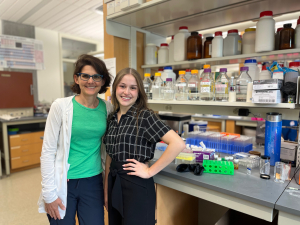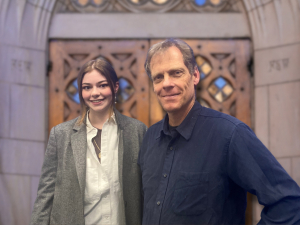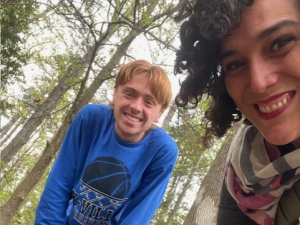
Turn the Lights On
Dance professor Iyun Harrison and student Leah Esemuede (T’24) discuss how the body is politicized in the ballet world, the vital role of artistic skills on overall student success, and the decisions a choreographer must make when staging a dance piece — including the importance of lighting design.
Related links:
Ballet Ashani
‘Giovanni’s Room’ A Powerful Reimagining of a Classic Story
Antiracism in Ballet Teaching
Full Transcript
Welcome to Duets, a podcast exploring the human side of research collaborations between Duke faculty and undergraduate students.
Today we're joined by faculty member Iyun Harrison and student Leah Esemuede, whose collaborative research in contemporary ballet choreography examines racial bias.
Iyun: My name is Iyun Harrison and I'm an Associate Professor of the Practice of Dance and the Director of Undergraduate Studies for the Dance Program. My primary research is in choreography, where I explore gender, sexualities and race — and in ballet leadership studies.
Leah: My name is Leah Esemuede. I'm a senior double majoring in Dance and Psychology with a minor in Spanish. I'm interested in the practice of professional dance and living as a Black dancer.
Iyun: So, Leah, how did you decide that you wanted to be a dancer?
Leah: My mom put me in dance when I was about four years old and, apparently, I hated it. But she just kept making me go and eventually, I really started to love it.
Iyun: My mom used to do marketing for a dance company in Jamaica. And she would bring me to the theater. I remember there was a solo by this gentleman, he came down out of the rafters of the theater and he was on some kind of string and he was spinning around, and he had a really flexible body. And I remember thinking, not that I wanted to dance, but — that I wanted to make dances like that.
Leah, what’s a common misconception that people have about dancers?
Leah: It seems to be there's a stereotype of dancers that were not smart. And I don't really understand it because there's so many things in dance that you have to think about, whether you're creating or just taking a class. So much body awareness that you have to have, but also being able to pay attention to everyone else in the room and the music that's going on. It takes a lot of commitment and hard work and practice, so this idea that dancers aren't smart just isn't true.
Iyun: All those things you've noted — taking choreography that you've learned and recalling it, or sometimes improvising in the moment, or receiving live feedback and having to incorporate it as you move — all of these skills that we develop in the arts are absolutely vital to successful students.
Leah: Incredibly vital. And I just want people — especially, like, identities like myself — to know that you can do both. Like, you don't have to just be smart or artistic. You can be smart and artistic.
Professor Harrison, when is a time that your research made you feel hopeful about the future of dance?
Iyun: In the process of working on the Anthology for Antiracism in Ballet Teaching, I was exposed to thinking about race in the arts — looking at what it meant to be Black and brown in ballet — in a very full way. There was something really revelational in the process, because we know Blackness is not fixed. Blackness is very full, right? So, I feel that what we came up with at the end of that process with the text had a hopeful kind of looking forward to what ballet could be. So, that felt like a moment of hope. I think also dance and making dances helps me to understand my world better and to feel like I have permission to be. And I say that in a sense of when, you know, we were sitting on stage after Giovanni's Room, that first show, and Brandon Pan — one of the dancers, the lead dancer in Giovanni's Room — you know, he went through these crying fits in rehearsal after he had finished dancing that pas de deux. You remember?
Leah: Yeah, I remember.
Iyun: Yeah, and he said on stage, in front of the whole audience, that he danced his whole life and never had the opportunity to be gay on stage and dance with another man and be in love with another man on stage in the way that his life plays out in daily experiences. And it felt to me, in that moment, that I had facilitated an atmosphere, created an environment where this person who was so gifted as a performer could truly be who he was. And I felt like I did something right. And that the audience heard it, right? It wasn't just a private conversation among the artists. That this person can live in a full way and share that experience, and it made me feel that my work had meaning beyond what people see on stage, which is often artifice.
Leah: I agree. Like, the audience would have never known that Brandon was having that experience if we didn't have the Q&A session at the end. But throughout the whole rehearsals, we all knew how important it was to Brandon. And hearing him say that on stage was very powerful for me. I remember Alyssa and I were sitting there trying not to cry because it was just so beautiful.
Iyun: Yeah, it was really pretty. It was a beautiful moment. Yeah.
Leah: I guess in a similar vein, I felt really hopeful about the research I was doing on stage. Last year, Choreo Lab, when I was setting my first work for, you know, it was like 10 minutes long, which was a really big task for me at the time. And I remember thinking all year about it, like, I just want to make a 10-minute piece and see what happens. And we get to the tech week and like everything was going wrong, that was just like anything possible — it was like, the costumes don't look good, and the biggest thing was the lighting for me. And I just remember thinking — how am I going to get through this? Like, where am I finding the time to actually finish this? And I felt hopeful because, like, you were there to help me. I remember sitting on stage, just like in tears. I was like, I don't know what's going to happen, but you jumped in so quickly to advocate for me, and you stood on stage, you came in early the next day to help me fix that. And it made me feel hopeful in the sense that I actually had someone who was willing to support me in dance when, like, being a Black dancer, it's not very common. So, having that experience made me feel hopeful for my future, but also for that of other dancers, and specifically Black dancers at Duke. Knowing that there was going to be someone there that would support them and advocate for them, in the same way that I experienced.
Iyun: Leah. Thank you for saying that. But you know, the work was very good. You have a very defined voice. I think one of the challenges we have is how when we get into the theater, how race politics start to play out. One has an aesthetic, right? And it's being filtered through lots of people. So, you have a mixed-race cast, right? People who are dark skin, dark brown, chocolate brown. And then we have people who are fair skin or white presenting, right? And the lights want to do very different things to those different complexions on stage, and kind of having to get in there and say: turn the lights on. And it was a nice moment to be able to be there and go — well, what happens if we do this? Let's try this. And ask you to come to the audience to see what your work looks like in different lights. And have you made the final decision about that.
Leah: Right now, since I'm in the lighting design classes, it’s something that I'm thinking about really deeply, and especially working on my own capstone. And again, I have a cast full of various different races and different skin tones. So, it's something that I'm having to balance a lot and consider, not even just the lighting, but the work itself and how race is going to play into that.
Iyun: We know the body's politicized, right? So, you really are negotiating those factors as you're choreographing. Like, what will people see? How will they read the work? We can't control that. But certainly, those questions that you're asking are important questions. And I think that sensitivity is evident when you watch the work.
Leah: I'm glad because it's something that I had to think so long and hard about.
Iyun: So, Leah, we're working on this new piece. Can you talk about how we started working on the pieces at school, at Duke, and how those kind of translate into the production with the professional dancers?
Leah: Yeah, I think this is a really cool and unique experience. Normally, these type of lab sessions are only in STEM fields. But you find an interesting way to bring that to the arts where we're using the performance ballet class to be incorporated into work and understand how the choreographic process works. Getting to that staging process was a bit difficult at first. They weren't students, they were professionals who came in — and having to understand how they work is a lot different than how students work. We're asking questions about the movement we're doing, or where's it coming from. So, I had to think a lot deeper about the choreography, a lot deeper than I had previously.
Iyun: Leah, that's great. You become the expert in the room. It’s no longer me, right? I turn over the work to you. And it's really exciting to hear you understand that. And I’m also geeking-out, just having this conversation with you. We spend so much time together between ballet class and rehearsals, but we never actually get to sit and talk about things that aren't related to the immediate task at hand. So, this is really cool that this is a facilitating opportunity for us to talk.
Leah: Yeah.
Iyun: So, Leah, what other plans or hopes do you have for your time immediately after Duke?
Leah: After Duke, I want to continue dancing and hopefully pursuing a long career in that professionally.
Iyun: That's really exciting. I'm glad to hear that.
We have big plans for Giovanni's Room going on tour in the coming year. To keep up with what we're doing, please visit BalletAshani.org or follow us on Instagram and Facebook and LinkedIn at Ballet Ashani.
Senior Editor and Producer: Cara August, Trinity Communications
Audio Editor and Mixer: Marc Maximov
Music Composition: Grace Davis, T’26
Production Sponsor: Trinity College of Arts & Sciences, Duke University
Recording Date and Location: March 2024, Bryan Center Studios
Duets is produced by Trinity College of Arts and Sciences at Duke University.



